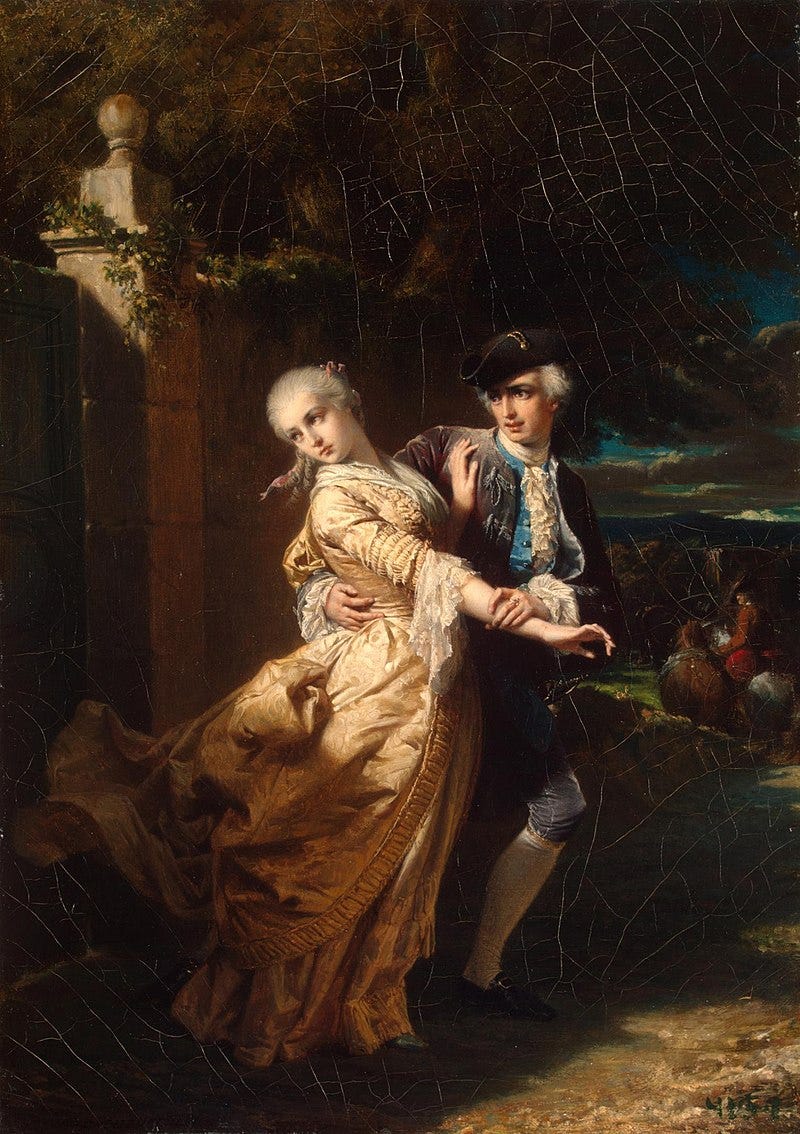Dear friends,
In the last fortnight we’ve read a whopping 150 pages and the pace of the novel has really picked up. Finally we have a new direction in the plot - Clarissa has run off with Lovelace and immediately realises it’s a terrible mistake. Perhaps it’s hindsight but, like Anna, I have a few questions about why Clarissa ever thought it might be a good idea. Richardson neatly removes all blame in Clarissa’s final flight, by having Lovelace trick her, but this isn’t an elopement and Clarissa still holds on to the unrealistic hope that she will be reconciled with her family and never have to marry at all. There’s a painful clash here between idealistic principles and the practicalities of real life. Clarissa seems caught in a world of her own imagination. Could she really expect that running off with a rake wouldn’t damage her reputation? Or that Lovelace will be happy to simply send her back to her relations? Should she try to save herself as Anna suggests, by endearing herself to Lovelace and persuading him to wed? Is this now her best and only option?
To criticise Clarissa for her naive attitude to her circumstances sounds a lot like victim blaming. Asking her to apply common sense to the situation seems to miss the point that she shouldn’t be in danger from Lovelace in the first place. What I’m enjoying about this part of the novel is the way in which Richardson is creating dramatic irony by showing us both sides of the story through the letters of both Clarissa and Lovelace. In his letters to Belford, Lovelace openly admits to his tricks and manipulations. In her letters to Anna, we see Clarissa falling for them. As readers, we know much more than either character causing the tension to really ramp up. It’s a masterful depiction of emotional manipulation and a moralistic takedown of eighteenth century seduction culture. We’ve now discovered that Lovelace has previously enticed away another young woman and raped her. It seems Clarissa might be on the same journey; the irony being that Solmes was going to share this information with Clarissa if she had been willing to listen.
The power dynamics are fascinating. Realising that her indiscretion in running away with Lovelace leaves her fully at his mercy, Clarissa becomes more high and mighty, more principled, less willing to bend. Feeling rejected with his pride wounded, Lovelace decides to put her virtue to the test. He sees women as actresses and begins to use Clarissa’s decision to run away with him against her: she said no at first and relented, so doesn’t that mean her other refusals can be tested too? Virtue (or chastity) cannot be considered virtue unless a woman proves it, declares Lovelace:
“I will bring this charming creature to the strictest test that all the sex… that all the sex, I say, may see what they ought to be.”
Whether Lovelace actually expects Clarissa to give way to his advances is unclear, but she will need all her wits to withstand them. “I have not found a virtue that cannot be corrupted,” he brags. To make matters worse, because he believes women to be changeable, one rejection by Clarissa will not suffice. He even argues that women should welcome such tests, to prove their worth. To readers at least, it is clear Lovelace will never get what he desires - Clarissa’s love and adoration - while he pushes her boundaries. But as we leave them this week, Lovelace is already turning on his charm offensive. Unlike Solmes, Lovelace realises women cannot be won over by fear. He will lull Clarissa into a false sense of security instead.
Looking forward to hearing what you think about these latest developments!
Featured image is Lovelace Abducting Clarissa Harlowe by Edouard Louis Dubufe, 1867. Many thanks to Tess Bentley for making me aware of this painting.


